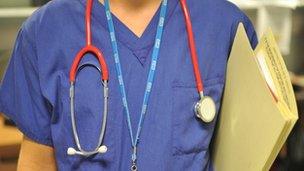Analysis: Is it too late to stop the NHS overhaul?
- Published

The major health unions have now said they oppose the changes being made
Health staff, it is fair to say, have given the government's NHS reforms a pretty big thumbs down.
The Royal College of Nursing and Royal College of Midwives have both joined the British Medical Association in moving from critical friend to outright opponent.
The other big health union - Unison, which represents admin and support staff such as porters - was against the plans from the start.
But despite the chorus of disapproval, ministers have pledged to push on.
The bill underpinning the changes is still in the Lords, but all the indications are that peers will pass it back to the Commons largely unscathed.
Focus would then return to the Lib Dems, who were instrumental in getting the government to carry out its "listening exercise" last spring.
But it seems unlikely they will rebel this time round - after all Nick Clegg proclaimed the changes made last summer as a victory for the coalition's junior partner.
However, regardless of this, even if there was the political will to scrap the bill, doubts remain whether it would even be possible in a practical sense.
The truth is there are two parts to the overhaul: The political process and the structural changes on the ground.
While the former has attracted a lot of attention, the latter has been happening largely unnoticed by the average patient.
Stopping the bill
The 151 primary care trusts, which are losing control of the NHS budget to GPs under the plans, have been merged into about 50 clusters, shedding thousands of jobs in the process.
The 10 strategic health authorities, which effectively kept an eye on the system, have also joined forces too to create four super hubs.
Meanwhile, despite the opposition from the major unions, enough GPs have come forward to set up the new commissioning groups, which will take charge of the NHS budget from April 2013, to cover 97% of the country.
Many of these bodies have already been set up - and some are even managing the budgets ahead of time.
Meanwhile, the national board, which will oversee the new system as well as taking charge of specialists services, such as heart surgery, is well on the way to being formed.
It has a chief executive - Sir David Nicholson who is the current NHS chief executive - and a medical director.
An interim finance chief has been appointed and the other seven members of the senior team are in the process of being recruited with salaries of up to £170,000 being offered. They are expected to be in place by March.
In short, it means in some respects it is too late.
As one senior union official said: "Yes we could scrap the bill, perhaps curb the involvement of the private sector, but what would we do with all the things that are already in place? We would have to have a long think about that."
- Published19 January 2012
- Published1 March 2013
- Published29 December 2011
- Published18 January 2012
- Published5 December 2011